-
ORIGINAL ARTICLE11-22-2024
Temporal trends in neonatal mortality in Pernambuco
Revista Brasileira de Enfermagem. 2024;77(4):e20230451
Abstract
ORIGINAL ARTICLETemporal trends in neonatal mortality in Pernambuco
Revista Brasileira de Enfermagem. 2024;77(4):e20230451
DOI 10.1590/0034-7167-2023-0451
Views0See moreABSTRACT
Objective:
To verify the temporal trend of neonatal mortality in the health regions of Pernambuco between 2000 and 2020.
Method:
A time-series ecological study was conducted, analyzing the total neonatal mortality rate and its early and late components. For regression analysis, Joinpoint Regression was applied, trends were classified, and annual and average percentage changes were calculated for the period, with a significance level of 95%.
Results:
The average neonatal mortality rate in Pernambuco was 11.5 during the studied period. A decreasing trend in neonatal mortality rate was observed, especially in the early component. The region where the state capital is located showed the fastest decrease across all components.
Conclusion:
The temporal trend of neonatal mortality was decreasing; however, the rate of reduction was not uniform across the health regions of the state, and the implementation of the Mãe Coruja Pernambucana Program did not impact the trend in neonatal mortality.
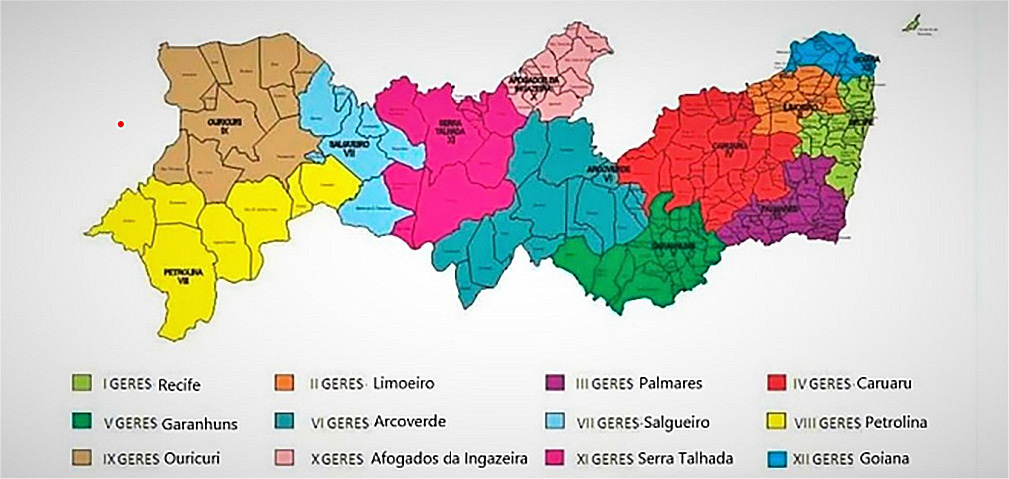
-
ORIGINAL ARTICLE11-22-2024
Evaluation of a video to promote HIV testing in sexual minorities
Revista Brasileira de Enfermagem. 2024;77(4):e20230320
Abstract
ORIGINAL ARTICLEEvaluation of a video to promote HIV testing in sexual minorities
Revista Brasileira de Enfermagem. 2024;77(4):e20230320
DOI 10.1590/0034-7167-2023-0320
Views0See moreABSTRACT
Objective:
To design and evaluate an educational video aimed at promoting HIV testing in gay men from the theoretical perspective of the Nola J. Pender Health Promotion Model.
Methods:
The design comprised five steps: 1.- Literature search; 2.- Formulation of the educational objective; 3.- Drafting of the script and location of the information in the theoretical components; 4.- Production; and 5.- Evaluation by experts and the target population.
Results:
The video “Living Without Fear” was produced, which presents the dilemma faced by gay men before taking a HIV test. The content validity index was 0.85, which indicated that the information was adequate and acceptable for promoting the rapid HIV test.
Final Considerations:
The results contribute to the scientific evidence aimed at promoting healthy behavior. In addition, the video was shown to be an acceptable educational tool.
-
ORIGINAL ARTICLE11-22-2024
Development and validity of a mobile application prototype for hospital shift handover
Revista Brasileira de Enfermagem. 2024;77(4):e20230173
Abstract
ORIGINAL ARTICLEDevelopment and validity of a mobile application prototype for hospital shift handover
Revista Brasileira de Enfermagem. 2024;77(4):e20230173
DOI 10.1590/0034-7167-2023-0173
Views0See moreABSTRACT
Objective:
To develop and validate a mobile application prototype for nursing shift handover in a hospital inpatient unit.
Methods:
A methodological study of technological production, carried out from April 2020 to January 2022, for mobile application construction and validity through the Design Thinking methodology. The study involved the stages of prototype development and validity by experts.
Results:
The application for mobile nursing shift handover obtained a usability score of 79 points and a content validity coefficient of 0.7.
Conclusions:
The instrument obtained an excellent assessment according to usability and agreement among experts. However, future studies are needed to implement this technology in order to assess effectiveness, time optimization and failures during communication.
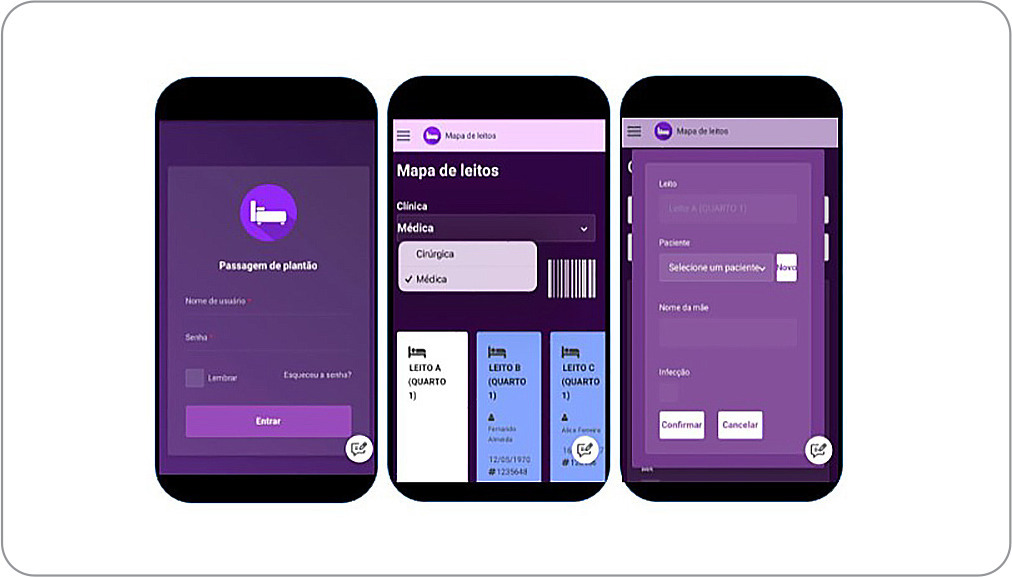
-
ORIGINAL ARTICLE10-25-2024
Analysis of the vaccination situation against Mpox in people living with HIV/AIDS: an ecological study
Revista Brasileira de Enfermagem. 2024;77(5):e20230234
Abstract
ORIGINAL ARTICLEAnalysis of the vaccination situation against Mpox in people living with HIV/AIDS: an ecological study
Revista Brasileira de Enfermagem. 2024;77(5):e20230234
DOI 10.1590/0034-7167-2023-0234
Views0See moreABSTRACT
Objectives:
to analyze the vaccination situation against Mpox in people living with HIV/AIDS in Brazil.
Methods:
an ecological study on the vaccination status against Mpox in people living with HIV/AIDS (PLWHA) in Brazil. The data were collected in April 2023 through information from the Ministry of Health, using the “Microsoft app Power BI,” which is publicly accessible.
Results:
the data analysis revealed that in Brazil, 2,978 doses of the MVA-BN Jynneos Mpox vaccine were administered in PLWHA, resulting in a vaccination coverage of 18.3%, with the southern and southeastern regions showing the lowest and highest vaccination coverage, respectively. Gender-based evaluation showed a higher proportion of vaccinated males.
Conclusions:
we identified low vaccination coverage in all regions of Brazil, highlighting the need for intensified vaccination activities, especially for PLWHA.
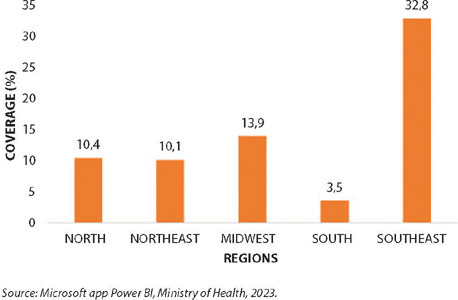
-
ORIGINAL ARTICLE10-11-2024
Indigenous women’s experiences about the pregnancy-puerperal cycle
Revista Brasileira de Enfermagem. 2024;77:e20230410
Abstract
ORIGINAL ARTICLEIndigenous women’s experiences about the pregnancy-puerperal cycle
Revista Brasileira de Enfermagem. 2024;77:e20230410
DOI 10.1590/0034-7167-2023-0410
Views0See moreABSTRACT
Objectives:
to understand the experiences of indigenous women regarding the pregnancy-puerperal cycle.
Methods:
qualitative, exploratory and descriptive research, carried out between May and August 2023 with 27 pregnant women from Indigenous Villages in Mato Grosso, Brazil, through open individual interviews. The data was analyzed using Reflexive thematic analysis.
Results:
data analysis resulted in the following themes: Cultivation of labor and birth in its natural and sacred path; Unique practices and beliefs associated with breastfeeding; Evolved or reductive thinking? The participants suggest inviolable practices and beliefs, which must be welcomed, respected and enhanced by indigenous health teams.
Final Considerations:
the experiences of indigenous women regarding the pregnancy-puerperal cycle are unique and motivated by inviolable cultural and religious beliefs, which transcend scientific knowledge, certainties and the linearity of contemporary approaches, normally established as order.
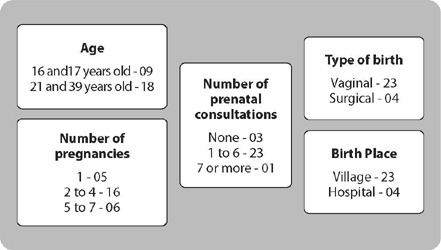
-
REVIEW10-07-2024
Risk factors associated with the occurrence of the adverse event phlebitis in hospitalized adult patients
Revista Brasileira de Enfermagem. 2024;77(5):e20240162
Abstract
REVIEWRisk factors associated with the occurrence of the adverse event phlebitis in hospitalized adult patients
Revista Brasileira de Enfermagem. 2024;77(5):e20240162
DOI 10.1590/0034-7167-2024-0162
Views0See moreABSTRACT
Objectives:
to synthesize knowledge regarding risk factors associated with occurrence of adverse event phlebitis in hospitalized adult patients.
Methods:
an integrative literature review, carried out in the CINAHL, PubMed, Virtual Health Library, Embase, Web of Science and Scopus databases. The stages were carried out independently by two reviewers, and the data were analyzed descriptively.
Results:
from the analysis of 31 quantitative primary studies, the following risk factors were summarized: length of stay; use of antibiotics; peripheral intravenous catheter dwell time; receive less nursing care; catheter inserted multiple times; patients with infection and comorbidities; presence of pain at catheter insertion site; Teflon® catheter use; reduced patient mobility; quality of patient’s vein; skin elasticity; unsuccessful insertion.
Conclusions:
it is necessary to standardize the format for measuring occurrence of this adverse event and develop new studies with a higher level of evidence.
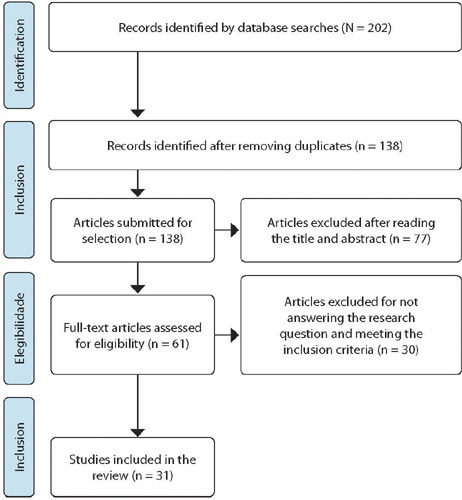
-
ORIGINAL ARTICLE10-07-2024
Indicators of emotional distress and mindfulness in undergraduate students: a cross-sectional study
Revista Brasileira de Enfermagem. 2024;77(5):e20230499
Abstract
ORIGINAL ARTICLEIndicators of emotional distress and mindfulness in undergraduate students: a cross-sectional study
Revista Brasileira de Enfermagem. 2024;77(5):e20230499
DOI 10.1590/0034-7167-2023-0499
Views0See moreABSTRACT
Objectives:
to assess the association between indicators of emotional distress and dispositional mindfulness in health students at a Brazilian federal public university.
Methods:
a cross-sectional study, developed with university students in the health area of a public institution from May to June 2022. In the analysis, multiple linear regression was used using SPSS software.
Results:
the sample was mostly female, ≤ 22 years old, non-white, studying the first semesters, with a higher prevalence for the medicine course. Students presented moderate dispositional mindfulness scores. It was observed that the variables of stress, depression and current suicide risk were associated with the capacity for mindfulness.
Conclusions:
knowing the indicators of emotional distress that are related to the potential of mindfulness can contribute as a situational diagnosis to better design strategies that promote the improvement of emotional indicators of health students.
-
ORIGINAL ARTICLE10-07-2024
Development and validation of a mobile application prototype for postoperative cardiac surgery
Revista Brasileira de Enfermagem. 2024;77(5):e20230491
Abstract
ORIGINAL ARTICLEDevelopment and validation of a mobile application prototype for postoperative cardiac surgery
Revista Brasileira de Enfermagem. 2024;77(5):e20230491
DOI 10.1590/0034-7167-2023-0491
Views0See moreABSTRACT
Objectives:
to develop and validate the content, appearance, and semantics of a prototype application for monitoring patients in the postoperative period of cardiac surgery.
Methods:
this is a technological development study based on Contextualized Instructional Design. The content and appearance evaluation was conducted by a committee of specialists, and semantic validation was carried out by patients from a cardiac surgery outpatient clinic.
Results:
the application prototype consisted of 43 screens, validated by 17 health specialists, with content validity ratio and appearance validity index results of 0.86 and 0.99, respectively. For semantic validation, 10 patients participated in data collection, with a total content validity index of 0.978.
Conclusions:
the prototype of the “VivaCor PósOp” application demonstrated evidence of content, appearance, and semantic validity, with the potential to stimulate self-care in patients in the postoperative period of cardiac surgery.
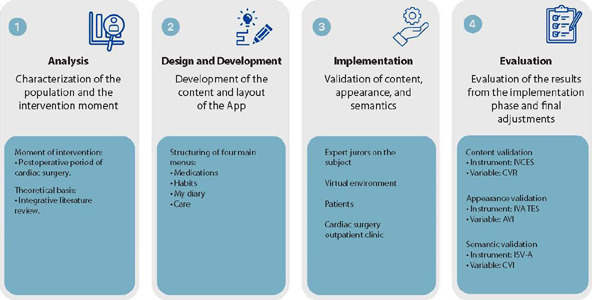
-
RESEARCH01-01-2018
Validation of a care protocol for the septic patient in the Intensive Care Unit
Revista Brasileira de Enfermagem. 2018;71(3):1106-1114
Abstract
RESEARCHValidation of a care protocol for the septic patient in the Intensive Care Unit
Revista Brasileira de Enfermagem. 2018;71(3):1106-1114
DOI 10.1590/0034-7167-2017-0312
Views0See moreABSTRACT
Objective:
to elaborate and validate a protocol for the care of the nurse to the septic patient in Intensive Care Units (ICUs).
Method:
instrument validation study. Two steps were followed: instrument development and content validation according to the Delphi technique.
Results:
the validation of contents related to the nurse’s assistance to the septic patient in intensive care was initially composed of eighteen items analyzed by the evaluators/judges. From this, through the Content Validity Index (CVI), thirteen items with strong evidence of validation were identified, CVI = 0.79. Then the instrument was refined, being then composed of fifteen items, which in the second phase Delphi had a percentage of agreement above 84% for the variables pertinent to the protocol.
Conclusion:
the method was effective to validate the contents of a protocol for the nurse’s assistance to the septic patient in the ICU.
-
RESEARCH01-01-2018
Assessment of the care process with orthotics, prosthetics and special materials
Revista Brasileira de Enfermagem. 2018;71(3):1099-1105
Abstract
RESEARCHAssessment of the care process with orthotics, prosthetics and special materials
Revista Brasileira de Enfermagem. 2018;71(3):1099-1105
DOI 10.1590/0034-7167-2017-0031
Views0See moreABSTRACT
Objective:
to assess potential failures in the care process with orthotics, prosthetics and special materials in a high-complexity hospital.
Method:
an intervention study conducted from March to October 2013. This process was assessed with the Failure Mode and Effects Analysis (FMEA) service tool. The data were analysed according to the risk and the corrective measures were defined.
Results:
no failure was classified as high risk and the corrective measures indicated as low and moderate risk had the following improvement initiatives suggested: standardize the material records in the information system; create a specific form to require materials; hire specialized technical personnel and create a continuous education program.
Conclusion:
all the suggested initiatives were implemented and helped to reduce the assistance risks for patients due to failures in this process. The actions increase safety levels and provide higher quality of service.
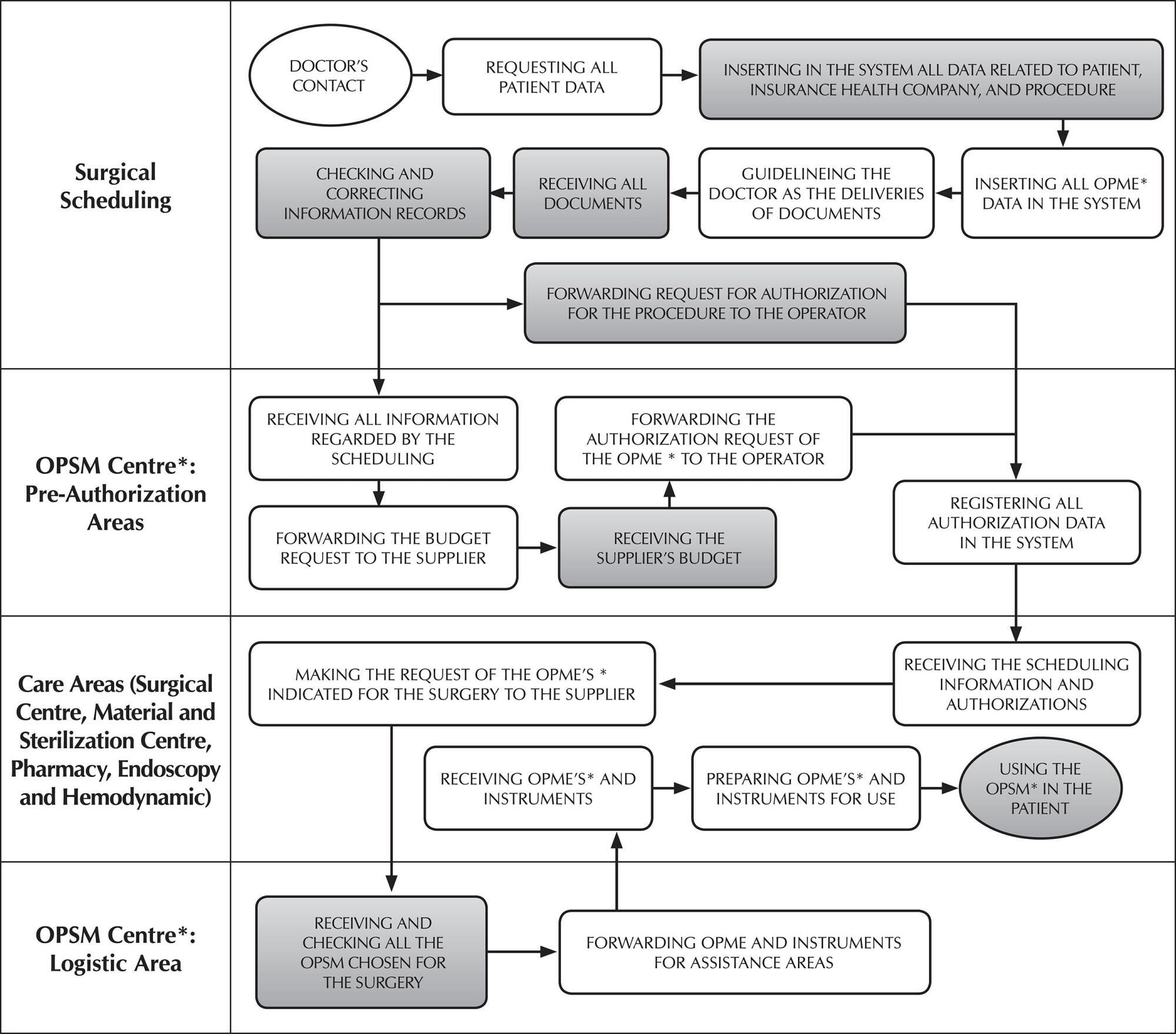
-
RESEARCH01-01-2018
Nursing care to patients with diabetes based on King’s Theory
Revista Brasileira de Enfermagem. 2018;71(3):1092-1098
Abstract
RESEARCHNursing care to patients with diabetes based on King’s Theory
Revista Brasileira de Enfermagem. 2018;71(3):1092-1098
DOI 10.1590/0034-7167-2016-0268
Views1See moreABSTRACT
Objective:
To verify the effectiveness of nursing interventions based on the Imogene King’s Theory of Goal Attainment, on improving care for people with diabetes and adherence to treatment.
Method:
Quasi-experimental, longitudinal, randomized, simple study in a Primary Health Care Unit, in the city of Fortaleza, Ceará state, Brazil. The sample consisted of 60 people with diabetes, divided into intervention and control groups, whose collection occurred from February to August 2013.
Results:
In the intervention group, a significant adherence of the patients to the goals defined in the study was found. In the control, there was improvement in some aspects of the treatment.
Conclusion:
With these results, it was possible to conclude the feasibility of using Theory of Goal Attainment in the positive aspects for adherence to diabetes treatment and improvement of quality of life.
-
RESEARCH01-01-2018
Intervention in social skills and bullying
Revista Brasileira de Enfermagem. 2018;71(3):1085-1091
Abstract
RESEARCHIntervention in social skills and bullying
Revista Brasileira de Enfermagem. 2018;71(3):1085-1091
DOI 10.1590/0034-7167-2017-0151
Views0See moreABSTRACT
Objective:
to verify if the improvement of social and emotional skills reduces bullying victimization in 6th grade students 12 months after the end of the intervention.
Method:
Quasi-experimental study with 78 students who were bullying victims. A cognitive behavioral intervention based on social skills was conducted with the intervention group. The eight sessions addressed politeness, making friendships, self-control, emotional expressiveness, empathy, assertiveness and solution of interpersonal problems. Data were analyzed using Poisson regression with random effect.
Results:
Quasi-experimental study with 78 students who were bullying victims. A cognitive behavioral intervention based on social skills was conducted with the intervention group. The eight sessions addressed politeness, making friendships, self-control, emotional expressiveness, empathy, assertiveness and solution of interpersonal problems. Data were analyzed using Poisson regression with random effect.
Conclusion:
Social skills are important in anti-bullying interventions and can be the basis for intersectoral interventions in the health area, aimed at favoring the empowerment of victims by improving their social interactions and quality of life in school.
-
RESEARCH01-01-2018
Structuring methodology of the Computerized Nursing Process in Emergency Care Units
Revista Brasileira de Enfermagem. 2018;71(3):1079-1084
Abstract
RESEARCHStructuring methodology of the Computerized Nursing Process in Emergency Care Units
Revista Brasileira de Enfermagem. 2018;71(3):1079-1084
DOI 10.1590/0034-7167-2016-0619
Views0See moreABSTRACT
Objective:
To structure the Computerized Nursing Process using the International Classification for Nursing Practice (ICNP®) version 2.0 to emergency care units in a computerized structure.
Method:
This is a methodological and technological research that followed the stages: (1) establishment of the development team and resources; (2) adequacy of clinical situations, diagnoses and nursing interventions for the emergency area; (3) association of diagnoses and interventions based on ICNP®; (4) organization and codification of clinical evaluation, diagnoses and nursing interventions; (5) transfer of data to the a computerized platform.
Results:
Readjustment and construction of 1,445 possibilities of clinical evaluations associated with 961 different diagnoses and their corresponding interventions to the most frequent situations in emergency services.
Conclusion:
ICNP® has a strong and solid form for the development of the computerized nursing process able to support nurses in safe decision-making to improve the quality of health care.
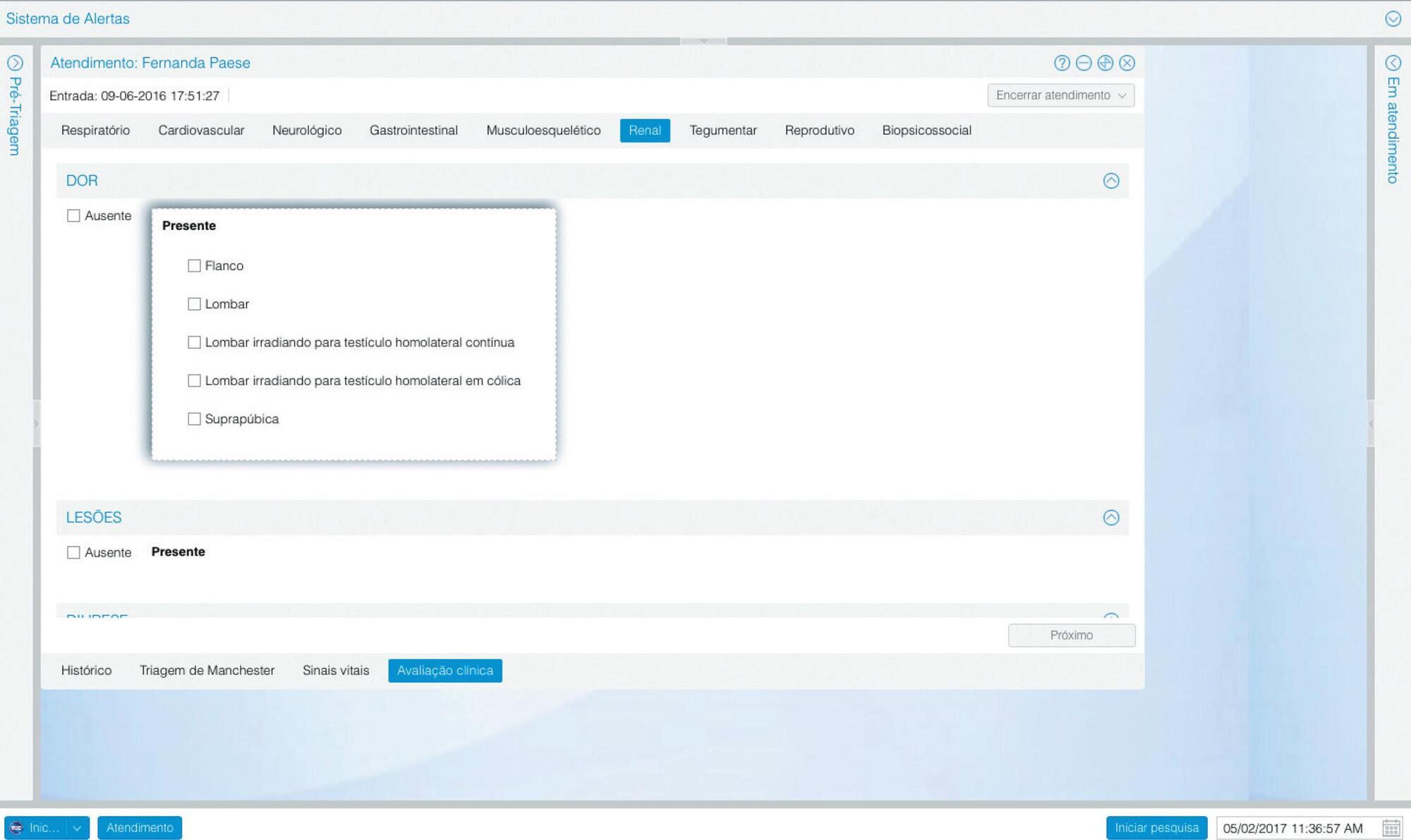
-
RESEARCH01-01-2018
Competencies for educational actions of Family Health Strategy nurses
Revista Brasileira de Enfermagem. 2018;71(3):1072-1078
Abstract
RESEARCHCompetencies for educational actions of Family Health Strategy nurses
Revista Brasileira de Enfermagem. 2018;71(3):1072-1078
DOI 10.1590/0034-7167-2017-0390
Views0See moreABSTRACT
Objective:
To create competencies for the educational actions of nurses in the care and management work processes at the Family Health Strategy.
Method:
This is an exploratory, descriptive research, with a qualitative approach, on nurses of the Family Health Strategy (FHS) from a municipality in the Greater São Paulo. It was performed through semi-structured interviews and workshops.
Results:
There is a set of specific competencies for the educational actions of the nurse in care work, geared towards meeting the health needs of users/community; and for educational actions in management work, focused on work organization of the health team, indicating the importance of this work to FHS.
Final considerations:
Creating competencies proved to be significant to reflect on the educational actions of the FHS nurses and can be used as a strategy in permanent education processes.
-
RESEARCH01-01-2018
Longitudinality in Primary Health Care: a comparison between care models
Revista Brasileira de Enfermagem. 2018;71(3):1063-1071
Abstract
RESEARCHLongitudinality in Primary Health Care: a comparison between care models
Revista Brasileira de Enfermagem. 2018;71(3):1063-1071
DOI 10.1590/0034-7167-2017-0014
Views0See moreABSTRACT
Objective:
to evaluate the attribute longitudinality in different models of assistance in Primary Health Care and observe its association with demographic, socioeconomic and health care characteristics.
Method:
a cross-sectional study, carried out in 2015 with 1076 adult users of primary care services in the 32 cities of the 4th Regional Health Care Core of Rio Grande do Sul State. The Primary Care Assessment Tool was used with definition of low (<6.6) or high (≥6.6) score for longitudinality. The association with independent variables was observed through the Poisson regression.
Results:
the attribute was better assessed in the Family Health Strategy and associate with age, housing health region and care model.
Conclusion:
the study points out the Family Health Strategy as a promoter of longitudinal care, and so, it suggests the expansion of this assistance model coverage for quality improvement in health care.
-
RESEARCH01-01-2018
Effectiveness of an educational intervention on knowledge-attitude-practice of older adults’ caregivers
Revista Brasileira de Enfermagem. 2018;71(3):1055-1062
Abstract
RESEARCHEffectiveness of an educational intervention on knowledge-attitude-practice of older adults’ caregivers
Revista Brasileira de Enfermagem. 2018;71(3):1055-1062
DOI 10.1590/0034-7167-2017-0100
Views0See moreABSTRACT
Objective:
To compare the knowledge, attitude and practice of older adults’ caregivers before and after an educational intervention in the domains of the care between caregiver and older adult, feeding, bathing, hygiene and mobility and transportation.
Method:
Quasi-experimental study carried out with 82 caregivers, of which 34 participated in the intervention. Interviews were conducted through a knowledge, attitude and practice research on the older adults` care
Results:
The educational intervention led to improvements in knowledge, attitude and practice, with statistical significance of attitude (p <0.020) and practice (p <0.001), in the domain of the care between caregiver and older adult; knowledge (p <0.001) and practice (p <0.003) in feeding; Knowledge (p <0.001) and practice (p <0.001) in bathing and hygiene; and knowledge (p <0.001), attitude (p <0.001) and practice (p <0.001) in mobility and transportation. The analysis of the 34 caregivers who started and completed the study showed an improvement in attitude in most of the domains.
Conclusion:
the educational intervention is an effective and viable strategy for older adults’ caregivers.
-
ORIGINAL ARTICLE12-16-2024
Health literacy development of Primary Health Care patients: qualitative research
Revista Brasileira de Enfermagem. 2024;77(6):e20240154
Abstract
ORIGINAL ARTICLEHealth literacy development of Primary Health Care patients: qualitative research
Revista Brasileira de Enfermagem. 2024;77(6):e20240154
DOI 10.1590/0034-7167-2024-0154
Views0See moreABSTRACT
Objectives:
to identify the process of health literacy development among primary care patients, relating it to their self-care practices.
Methods:
qualitative, prospective research with 22 patients from two Family Health Strategy units. Data were obtained through individual semi-structured interviews, examined through descriptive statistics and thematic content analysis.
Results:
the results discuss how participants learn about health and how this resonates in their behaviors, culminating in two thematic categories: “Health knowledge construction”; and “Dialogue between health knowledge construction and patient care actions”.
Final Considerations:
health knowledge is developed mainly through interpersonal relationships, mediated by health professionals through bonding and communication. Community educational actions and training of health professionals in communication can promote health literacy and self-care among patients.

-
ORIGINAL ARTICLE12-16-2024
Analysis of omission of antimicrobial doses in Intensive Care Units
Revista Brasileira de Enfermagem. 2024;77(6):e20240102
Abstract
ORIGINAL ARTICLEAnalysis of omission of antimicrobial doses in Intensive Care Units
Revista Brasileira de Enfermagem. 2024;77(6):e20240102
DOI 10.1590/0034-7167-2024-0102
Views0See moreABSTRACT
Objectives:
to analyze the rate of antimicrobial dose omission in intensive care units.
Methods:
cross-sectional study carried out between March 1 and September 30, 2023, in intensive care units of a University Hospital in Rio de Janeiro.
Results:
the sample consisted of 452 prescriptions and 1467 antimicrobial doses. The dose omission rate was 4.29%. Each antimicrobial prescribed increased the chance of omission by 51%. The strategy of double-checking prescriptions helped prevent 30% of antimicrobial dose omissions (p=0.0001).
Conclusions:
monitoring the omission of antimicrobial doses can guide nursing actions to improve quality and patient safety, contributing to the prevention of medication errors, antimicrobial stewardship and the fight against antimicrobial resistance.
-
REVIEW12-16-2024
Recommendations for guidelines for promoting mental health in the workplace: an umbrella review
Revista Brasileira de Enfermagem. 2024;77(6):e20240086
Abstract
REVIEWRecommendations for guidelines for promoting mental health in the workplace: an umbrella review
Revista Brasileira de Enfermagem. 2024;77(6):e20240086
DOI 10.1590/0034-7167-2024-0086
Views1See moreABSTRACT
Objectives:
to summarize the recommendations of guidelines for promoting mental health in the workplace.
Methods:
an umbrella review, according to Joanna Briggs Institute and Preferred Reporting Items for Systematic reviews and Meta-Analyses methodological assumptions. Data collection was carried out in January 2021 and updated in July 2023 in the American Psychological Association, Cochrane Library, EMBASE, National Library of Medicine, and Scopus databases. Systematic reviews that assessed guidelines with recommendations for mental health care for workers were included. PROSPERO registration CRD42023461845.
Results:
four systematic reviews published between 2015 and 2018 were identified. The abstracts highlighted actions that facilitate and inhibit the recommendations as well as three categories of intervention: primary prevention – worker protection; secondary prevention – promoting workers’ mental health; and tertiary prevention – supporting, monitoring and rehabilitating workers upon returning to work.
Conclusions:
the interventions are based on prevention, promotion and early recognition, support and rehabilitation of mental health problems.

-
ORIGINAL ARTICLE12-16-2024
Psychometric analysis of ProQOL-BR in nursing: building hospital safety and protection
Revista Brasileira de Enfermagem. 2024;77(6):e20240085
Abstract
ORIGINAL ARTICLEPsychometric analysis of ProQOL-BR in nursing: building hospital safety and protection
Revista Brasileira de Enfermagem. 2024;77(6):e20240085
DOI 10.1590/0034-7167-2024-0085
Views0See moreABSTRACT
Objectives:
to analyze the psychometric properties of the ProQOL-BR instrument in hospital nursing professionals.
Methods:
a methodological study to validate the ProQOL-BR. Confirmatory factor analysis, assessment of local and global adjustment quality, Pearson hypothesis testing and Cronbach’s alpha internal consistency analysis were used.
Results:
a total of 490 professionals participated. The model presents adequate quality due to factor weights (λ≥ 0.40), acceptable overall fit quality and adequate chi-square ratio and degrees of freedom (χ2/g.1=2.51) for the parameters of CFI (0.923), GFI (0.902), TLI (0.914) and RMSEA (0.042). In terms of validity, it was shown to be adequate with CC=0.89. The internal consistency obtained by standardized Cronbach’s alpha was 0.761. Criterion validity was shown to be favorable with significant correlations (0.001).
Conclusions:
the instrument was validated regarding content, criteria and reliability. Three questions were removed from the original instrument, ProQOL-BR, leaving the final instrument with 25 questions.

-
12-16-2024
GerenciaDOR™: development of digital technology by nurses for the assessment of patients with chronic pain
Revista Brasileira de Enfermagem. 2024;77(6):e20240050
Abstract
GerenciaDOR™: development of digital technology by nurses for the assessment of patients with chronic pain
Revista Brasileira de Enfermagem. 2024;77(6):e20240050
DOI 10.1590/0034-7167-2024-0050
Views0See moreABSTRACT
Objectives:
to develop a digital technological solution (prototype) for assessing patients with chronic pain.
Methods:
this is a methodological and technological development study based on the Human-Centered Design framework and the principles of Patient-Centered Care. The prototype guides patients through a body diagram and directs them to an evaluation using specific instruments that address the multidimensional aspects of chronic pain.
Results:
the GerenciaDOR* project enables navigation through the Web App screens, providing access to pain assessment features up to the presentation of results.
Final Considerations:
the study describes a systematic approach to pain assessment and expands nurses’ knowledge in pain management. Additionally, it can promote the development of other digital technologies for chronic pain assessment and contribute to a multidisciplinary, patient centered treatment.

-
ORIGINAL ARTICLE12-16-2024
Respectful care for postpartum women with sickle cell disease: a netnographic study
Revista Brasileira de Enfermagem. 2024;77(6):e20230545
Abstract
ORIGINAL ARTICLERespectful care for postpartum women with sickle cell disease: a netnographic study
Revista Brasileira de Enfermagem. 2024;77(6):e20230545
DOI 10.1590/0034-7167-2023-0545
Views0See moreABSTRACT
Objectives:
to analyze principles of respectful maternity care in narratives of postpartum women with sickle cell disease, relating them to Sustainable Development Goals.
Methods:
netnographic study, with two videos published in 2020. Deductive iconographic and thematic analysis by Respectful Maternity Care Charter, organized in MAXQDA.
Results:
principles identified were the right to: freedom from harm and ill-treatment; information, informed consent, refusal of medical procedures, and respect for their choices and preferences including companion; be considered a person from birth, with dignified and respectful treatment; health at the highest possible level; newborns being with their parents or guardians. The Sustainable Development Goals for women by 2030 were not positively contemplated in postpartum women’s experience.
Final Considerations:
it is appropriate that health workers qualify themselves to provide respectful maternity care, with qualified listening, understanding, and resolution of unique demands of postpartum women with sickle cell disease, seeking equality in care for women.

-
ORIGINAL ARTICLE12-16-2024
Construction and validation of an educational game on biosafety in the central sterile supply department
Revista Brasileira de Enfermagem. 2024;77(6):e20230478
Abstract
ORIGINAL ARTICLEConstruction and validation of an educational game on biosafety in the central sterile supply department
Revista Brasileira de Enfermagem. 2024;77(6):e20230478
DOI 10.1590/0034-7167-2023-0478
Views0See moreABSTRACT
Objectives:
to construct and validate an educational game on biosafety in the Central Sterile Supply Department of a hospital in Curitiba, PR.
Methods:
the study was conducted using a quantitative approach, employing applied and technological research with an exploratory design. The process was divided into six stages, from the definition of the theme to the validation and application of the game. The study was carried out from May to August 2022, involving 17 nursing professionals from a Central Sterile Supply Department during day and night shifts, as well as 9 judges.
Results:
the study resulted in the construction of a board game named by the authors as “My Health First.”
Conclusions:
the research achieved its objective of constructing and validating an educational game. By reflecting on professional practice and correlating the occupational risks present, the professionals were able to list safe actions, identify problems, and seek solutions.

-
ORIGINAL ARTICLE12-16-2024
Training profile of intensive care nurses in Brazil: cross-sectional study
Revista Brasileira de Enfermagem. 2024;77(6):e20230460
Abstract
ORIGINAL ARTICLETraining profile of intensive care nurses in Brazil: cross-sectional study
Revista Brasileira de Enfermagem. 2024;77(6):e20230460
DOI 10.1590/0034-7167-2023-0460
Views0See moreABSTRACT
Objectives:
to describe the training profile of Brazilian intensive care nurses.
Methods:
a cross-sectional study carried out in two stages: a structured, self-administered questionnaire; mapping of the national supply of lato sensu postgraduate courses. Data was collected on the sociodemographic profile, training process and characterization of the courses.
Results:
in the first stage, 202 respondents were obtained. The majority were women (79.2%), aged between 26 and 45 (80.7%), graduated less than 5 years ago (44%), through lato sensu postgraduate courses (55.5%), which were marked by the absence of laboratory practice (57.5%) and guided tours (42.5%). In the second stage, 457 courses were identified, with face-to-face teaching (58.9%), a workload of 360 to 420 hours (51.2%), a duration of up to 6 months (41.8%) and variation in the sub-area of training.
Conclusions:
there was a predominance of professionals graduating from lato sensu post-graduate courses, with essentially theoretical teaching and heterogeneity in terms of modality, workload and sub-area of training.
Search
Search in:
Nuvem de Tags
Adolescente (85) Atenção Primária à Saúde (239) COVID-19 (91) Criança (91) Cuidados de Enfermagem (269) Educação em Enfermagem (151) Educação em Saúde (139) Enfermagem (930) Enfermagem Pediátrica (86) Estudantes de Enfermagem (77) Estudos de Validação (131) Família (87) Idoso (208) Promoção da Saúde (99) Qualidade de Vida (104) Saúde do Trabalhador (86) Saúde Mental (145) Saúde Pública (82) Segurança do Paciente (150) Tecnologia Educacional (100)



